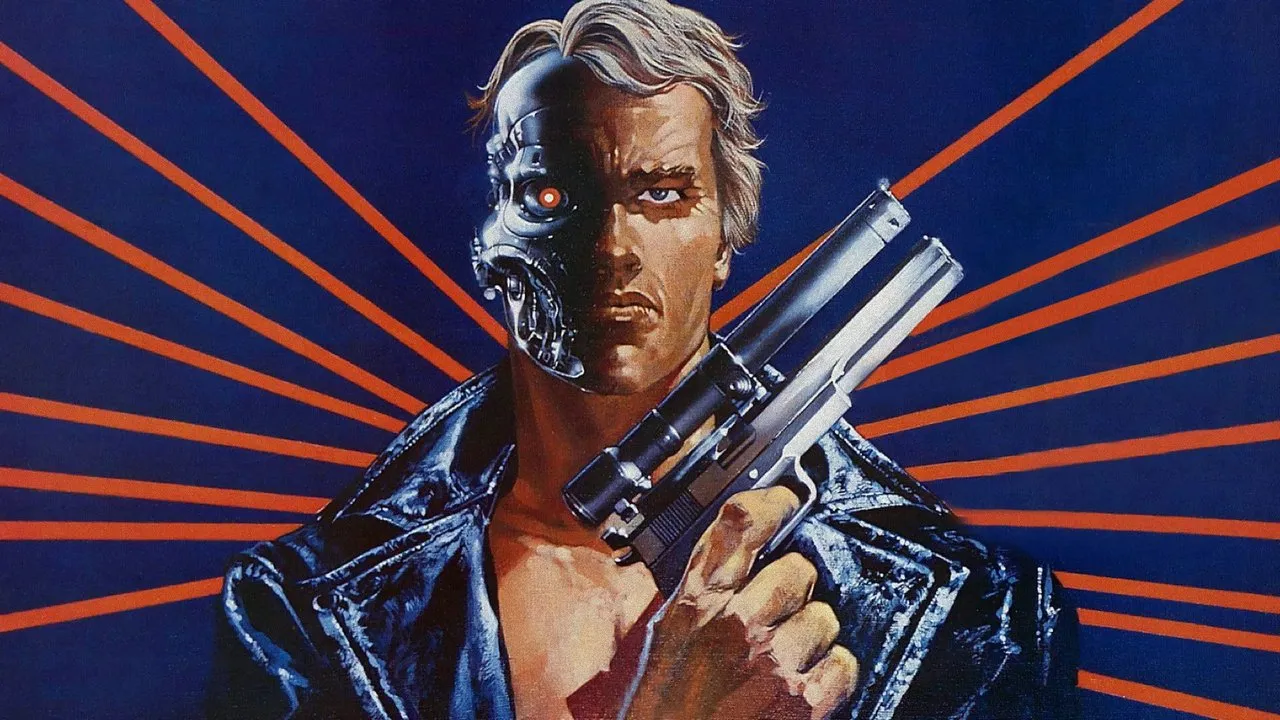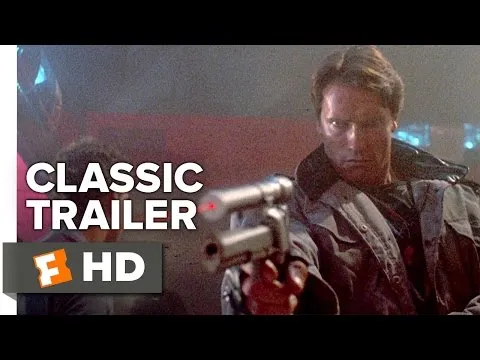
Science fiction fans are seldom satisfied with the way their favourite genre is used in films, especially those produced in Hollywood. More often than not filmmakers totally forget the meaning of "science" in the term "science fiction", and such films ignore basic scientific facts, as well as elementary logic. This is especially the case with time travel films. Screenwriters of such films are more than eager to embrace the concept of time travel (which is rather controversial in the realm of established science), but they seldom pay attention to some mind-boggling issues associated with it, like Grandfather Paradox. Fortunately, there are few filmmakers ready to approach time travel with these problems in mind. One of them was young Canadian director James Cameron. In 1984 he co-wrote and directed The Terminator, low-budget science fiction film that would launch one of the most spectacular careers in modern Hollywood and also become one of the most influential films of its time.
Script for The Terminator, written by Cameron and his producer Gale Anne Hurd, was based on the original screenplay by Harlan Ellison (fact established after serious litigation). The plot begins in Los Angeles 2029 AD. The world was ravaged by nuclear holocaust and the surviving humans are fighting desperate war against sentient machines. From this world two time travellers arrive to Los Angeles in 1984. The first one is Terminator (played by Arnold Schwarzenegger), human looking but deadly and seemingly indestructible cyborg. His mission is to kill Sarah Connor (played by Linda Hamilton), future mother of John Connor, charismatic leader of human resistance. Another time traveller is Kyle Reese (played by Michael Biehn), Connor's soldier from the future, and his mission is to protect the mother of his commander. When he finds Sarah Connor, she doesn't believe his story, but all her suspicions are swept away when the unstoppable, remorseless and invulnerable killer starts chasing them on the streets of Los Angeles.
Today most people think of James Cameron as Hollywood's greatest and most successful megalomaniac whose trademark is big budget of his movies. In 1984 the budget for his groundbreaking film was quite low, even for the standards of the time. However, even in such conditions, Cameron's talent of superb filmmaker became more than evident. Few filmmakers are able to achieve things Cameron had done with The Terminator – to create successful combination of interesting and thought-provoking science fiction, powerful human drama and action-packed thrillride.
Unlike most of the other time travel movies, The Terminator takes time travel quite seriously and the Grandfather Paradox here builds the plot instead of destroying its plausibility. In this film the future is set and the characters are aware than that they can't escape it; instead of trying to change their destiny, they fight to preserve it, no matter how ugly and depressing it might be in the end. The atmosphere of impending doom could be sensed throughout the film. Cameron, obviously inspired by the heightened Cold War tensions of Reagan years and worried about possibility of sophisticated and automated weapons systems running out of control, uses these fears to build the vision of future apocalypse, which is even more frightening, because it shares many elements with the world of 1984. Low budget, which forced Cameron to shoot this film at night and in the back alleys of Los Angeles, actually helps this film. In this dark, cold and unforgiving world of 1984 Los Angeles we could see glimpses of 2029 - bums in the street, which are not very different from the surviving post-holocaust humans or robot factories that probably use the same technology of future killing machines. This was good opportunity for Cameron to establish his trademark - ambivalent portrayal of technology. While he obviously admires efficiency of machines and their obvious superiority over frail humans, Cameron in this film also shows frightening consequences of technology running amok and turning their former human masters into slaves.
Thing that separates The Terminator from most of the other science fiction films is not just technical superiority or intelligent message. Cameron also brings very strong human dimension to this film. Characters in this film aren't cardboard or stereotypical - in relatively short amounts of time, before the action sets in, we meet them as three dimensional, convincing human being and later we sympathise with their plight. This is the technique that would serve Cameron very well in his later films like Aliens or The Abyss. For that he had to rely on very good actors. Although the first actor associated with this film happens to be Arnold Schwarzenegger, his non-human character of Terminator is convincing more because of his frightening physical appearance. Schwarzenegger's one-liners (including his trademark phrase "I'll be back"), spoken in robotic monotone and with heavy Austrian accent, didn't require much of the acting ability. On the other hand, such ability was perfectly demonstrated by two other leads. Linda Hamilton was excellent choice for the role of Sarah Connor; not very attractive in a physical sense, she is quite convincing as an average woman caught in nightmarish situation. Her slow evolution from clueless and helpless damsel in distress to tough feminist role model in wonderful to watch. Michael Biehn, one of the most underused actors of modern Hollywood, is also great as her heroic and vulnerable partner; the audience can sense the pain and anguish on his troubled face. Finally, Cameron relies on the services of very capable character actors Lance Henriksen and Paul Winfield as police detectives; their roles as voices of reason and "normalcy" actually are the closest equivalent of comic relief in this grim tale.
Engaging story, superb acting and moviemaking craftsmanship - all that ensured that The Terminator remains as one of the best films of 1980s. Unfortunately, the reputation of this film was later influenced by its more expensive, more spectacular, better-hyped but ultimately inferior 1991 sequel. Compared with it, The Terminator looks rather cheap, at first glance almost indistinguishable from the hundreds of its own C-grade rip-offs made in late 1980s. Person that could be responsible for such impression is Brad Fiedel, author of musical score, which is hardly impressive except the main theme. This unimpressive musical score, however, is hardly the reason to view The Terminator as less than excellent piece of science fiction cinema.
RATING: 9/10 (++++)
(Note: The text in its original form was posted in Usenet newsgroup rec.arts.movies.reviews on May 19th 2000)
==
Blog in Croatian https://draxblog.com
Blog in English https://draxreview.wordpress.com/
Cent profile https://beta.cent.co/@drax
Minds profile https://www.minds.com/drax_rp_nc
Brave browser: https://brave.com/dra011
BTC donations: 1EWxiMiP6iiG9rger3NuUSd6HByaxQWafG
ETH donations: 0xB305F144323b99e6f8b1d66f5D7DE78B498C32A7
Movie URL: https://www.themoviedb.org/movie/218-the-terminator
Critic: AAA

